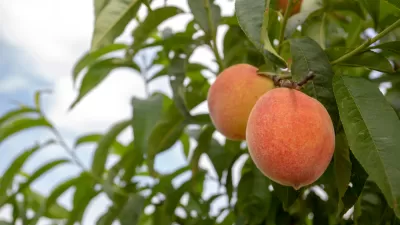An article by Colleen Fuller highlights collaborative initiatives in Maine's food system as well as key challenges the state faces in reaching a goal of increasing and broadening access to, and consumption of, local food.
Maine is investing more in local agriculture and is taking steps to return to a time when Maine was the "bread basket of the Northeast" and the majority of food consumed in Maine was produced in Maine. States interested in promoting local foods as part of larger planning efforts can learn from the successful collaborative approaches activating interest in Maine's food system.
Collaborative initiatives in Maine's food system include:
- Local Food Councils. Spearheaded by the Maine Network of Community Food Councils, local councils across the state apply a systems approach to supporting and strengthening food production and access. Efforts include the Maine Food Atlas, an asset mapping tool focused on food.
- Maine Food Strategy. This initiative is convening a statewide participatory process that will identify and advance shared goals to support a robust food economy in our state.
- Maine Local Foods Access Network (MLFAN), a group of Maine nonprofits collaborating to improve low-income access to locally grown foods across the state. Activities include Maine Harvest Bucks, where SNAP shoppers receive bonus local fruits and vegetables, stretching limited benefits much further.
- Maine's Farm and Fish to School. This network knits together a wide diversity of students, teachers, school nutritionists, parents, farmers and groups who support child nutrition and Maine agriculture.
- Maine Farm & Sea Cooperative, a procurement and food service management company that provides Maine institutions with the highest possible percentage of locally produced, value-added food.
Despite Maine's growing food revolution, there are challenges to promoting local food, such as the lack of processing facilities and poor infrastructure.
Planners can support local food initiatives by having strong, clear ordinances that prevent conflict between producers and their neighbors, such as local ordinances that strengthen state right-to-farm rules and allow farm stands and farmers' markets.
FULL STORY: Maine’s Road to a Food Revolution

Planetizen Federal Action Tracker
A weekly monitor of how Trump’s orders and actions are impacting planners and planning in America.

San Francisco's School District Spent $105M To Build Affordable Housing for Teachers — And That's Just the Beginning
SFUSD joins a growing list of school districts using their land holdings to address housing affordability challenges faced by their own employees.

The Tiny, Adorable $7,000 Car Turning Japan Onto EVs
The single seat Mibot charges from a regular plug as quickly as an iPad, and is about half the price of an average EV.

Seattle's Plan for Adopting Driverless Cars
Equity, safety, accessibility and affordability are front of mind as the city prepares for robotaxis and other autonomous vehicles.

As Trump Phases Out FEMA, Is It Time to Flee the Floodplains?
With less federal funding available for disaster relief efforts, the need to relocate at-risk communities is more urgent than ever.

With Protected Lanes, 460% More People Commute by Bike
For those needing more ammo, more data proving what we already knew is here.
Urban Design for Planners 1: Software Tools
This six-course series explores essential urban design concepts using open source software and equips planners with the tools they need to participate fully in the urban design process.
Planning for Universal Design
Learn the tools for implementing Universal Design in planning regulations.
Smith Gee Studio
City of Charlotte
City of Camden Redevelopment Agency
City of Astoria
Transportation Research & Education Center (TREC) at Portland State University
US High Speed Rail Association
City of Camden Redevelopment Agency
Municipality of Princeton (NJ)



























